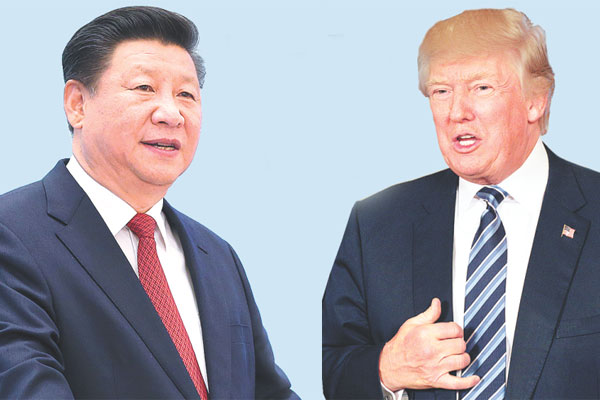Media Report

- The Wall Street Journal:Beijing's Patience Pays Off With Trump's Reaffirmation of 'One-China' PolicyThe Wall Street Journal reports: "China's wait-and-see approach to U.S. President Donald Trump's periodic diplomatic outbursts has paid off with the president dropping his threat to upend a cornerstone of Beijing-Washington relations. After weeks of several phone run-ins with world leaders, Mr. Trump committed to a longstanding agreement that the U.S. won't recognize Taiwan diplomatically in a phone call with President Xi Jinping late Thursday. The Trump administration had already moved to temper heated rhetoric around U.S. policy in Asia, and the call marked a detente in a relationship that was thrown into uncertainty by Mr. Trump's December phone conversation with Taiwan's leader, which broke decades of diplomatic protocol. Beijing, which had made clear to the Trump administration that U.S. adherence to the 'One China' policy was an inviolable precondition for relations, praised Mr. Trump's change of heart. Mr. Xi expressed his appreciation during the call, according to the state-run Xinhua News agency. China's Foreign Ministry also welcomed Mr. Trump's pledge to uphold the policy, but ministry spokesman Lu Kang didn't directly address a question about whether China had had to make any concessions in return."
- The Associated Press reports: "A Chinese early warning aircraft and a U.S. Navy patrol plane had an 'unsafe' encounter over the South China Sea this week, the U.S. Pacific Command said Friday, in the first such incident known to have taken place under President Donald Trump's administration. The interaction between a Chinese KJ-200 and a U.S. Navy P-3C plane took place on Wednesday in international airspace, Pacific Command spokesman Robert Shuford said. He did not say what was unsafe about the encounter, although the term usually implies planes flying too close to one another. Shuford says the U.S. plane was on a routine mission and operating according to international law. The Department of Defense and the Pacific Command 'are always concerned about unsafe interactions with Chinese military forces,' he said. The Chinese Defense Ministry did not immediately respond to a faxed request for comment. However, the website of the Communist Party newspaper Global Times quoted an unidentified ministry official as saying that the Chinese pilot had responded in a 'legal and professional manner.' "
- Quartz comments: "A new policy takes effect in China today (Feb. 10) that requires foreigners to hand over their fingerprints. The government is starting to collect the fingerprints of travelers at Shenzhen International Airport, which sits at the border between Hong Kong and China, before rolling it across all entry and exit points in the mainland by the end of 2017, according to the Ministry of Public Security. With the exception of diplomats, all foreigners between the ages of 14 and 70 will be required to go through this step. 'To collect the biometric information is an important measure to enhance border control that has been adopted by several countries,' said the ministry (link in Chinese). The practice is in line with border protocols in the US and Japan. There were more than 13 million overseas visitors to China in 2016, according to a report by China's National Tourism Administration in January last year."
Calendar
- 2017-02-09 China Praises Trump's Letter to Xi, Belated Well-Wishes
- 2017-02-08 Task force backs Trump’s tough line on China trade
- 2017-02-07 China, United States cannot afford conflict: Chinese foreign minister
- 2017-02-06 EU trade chief backs China in fight against protectionism
- 2017-02-05 Chinese Luxury Shoppers' Newest Destination: China
- 2017-02-03 U.S.-China War Over Sea Reefs Won’t Happen, Philippines Says
- 2017-02-02 Can Jim Mattis Fix Asia?
- 2017-02-01 China Manufacturing Activity in January Close to 2-Year High
- 2017-01-25 China Can Thrive in the Trump Era
- 2017-01-24 Trump TPP move seen as win for China, but Beijing isn’t celebrating
News
- The Wall Street Journal Beijing's Patience Pays Off With Trump's Reaffirmation of 'One-China' Policy
- The Associated Press US, Chinese Aircraft in 'Unsafe' Encounter Over S. China Sea
- Reuters Trump tax cut talk, Chinese data spur risk rally
- The New York Times Plan for $10 Billion Chip Plant Shows China's Growing Pull
- Variety Theater-Goers in China Continue to Embrace Movies From Hong Kong
- The New York Times China and Vatican Near Pivotal Deal on Bishops
- The New York Times Trump, Changing Course on Taiwan, Gives China an Upper Hand
- The Associated Press Stock Regulator: China Plans to 'Capture' Suspects Abroad
- Bloomberg China Said to Assess Impact of Possible Punitive U.S. Tariffs
- Bloomberg Iron Ore Powers Back to $100 in World's Top User as Miners Surge
- Reuters Robust China trade data a boon for Asia as protectionist risks loom
- The Financial Times Major Chinese bitcoin exchanges halt withdrawals after crackdown
- The Financial Times Chinese-backed Forest City rises above the sea
Commentary
- Quartz China is collecting the fingerprints of foreigners entering the country
- Forbes Shrinking FX Reserves: Will China Defend The RMB?
- The Diplomat China's Xi Finally Speaks to Trump, Who Affirms US 'One China' Policy: Major Takeaways
- Foreign Policy China's Youth Admire America Far More than We Knew
- The National Interest China Really Hates THAAD (But So Does Russia)
- The Washington Post: Opinion President Trump showcases his media illiteracy
- Reuters Trump Just Promised Chinese President Xi Jinping to Honor the 'One China' Policy
